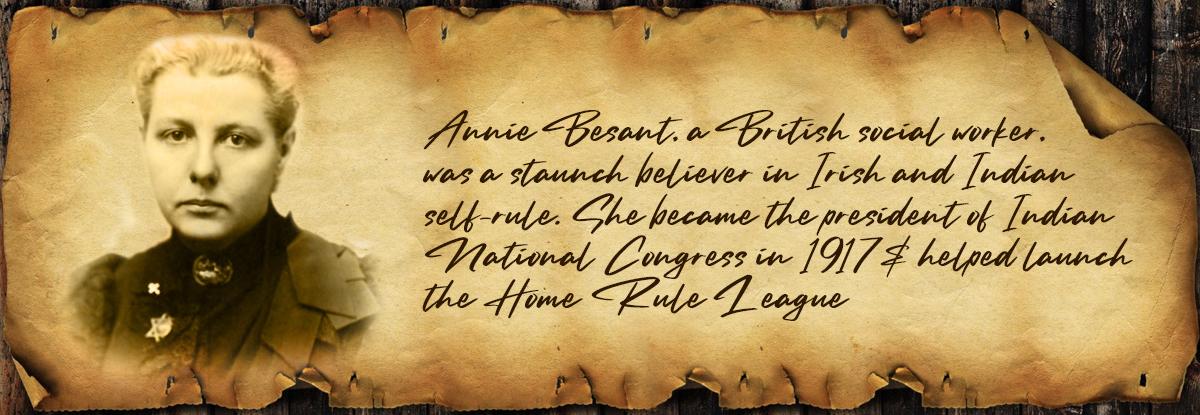ANNIE BESANT
A BRITISH SOCIALIST, THEOSOPHIST, WOMENʼS RIGHTS ACTIVIST, WRITER AND ORATOR, AND SUPPORTER OF IRISH AND INDIAN SELF-RULE, ANNIE BESANT (OCTOBER 1, 1847 ‒ SEPTEMBER 20, 1933) IS AN INTEGRAL FIGURE IN THE HISTORY OF INDIAʼS STRUGGLE FOR FREEDOM. IN 1867, YOUNG ANNE MARRIED FRANK BESANT, A CLERGYMAN, WHEN SHE WAS BARELY 20 YEARS OLD. THEY HAD TWO CHILDREN. BUT ANNIEʼS INCREASINGLY ANTI-RELIGIOUS VIEWS LED TO A LEGAL SEPARATION IN 1873.
After her separation, Annie Besant began to question not only her long-held religious beliefs but the whole of conventional thinking. She fought for the causes she thought were right, such as womenʼs rights, secularism, birth control, Fabian Socialism and workersʼ rights. She became interested in Theosophy as a way of knowing God after meeting the charismatic Helena Blavatsky in 1890. Theosophical Society was against discrimination of race, colour and gender, and preached Universal Brotherhood. Its supreme goal was to serve humanity at large. It was as a member of Theosophical Society of India that she arrived in Bombay in 1893. As part of her theosophy-related work, she travelled the entire country getting first-hand information not only about the vagaries of India but also middle-class Indians who were affected by British rule and its system of education. Her long-time interest in education resulted in the founding of the Central Hindu College at Benares in 1898.
In 1922 she helped establish the Hyderabad (Sind) National Collegiate Board in Mumbai and in 1902 she launched the first overseas lodge of the International Order of Co-Freemasonry, Le Droit Humain. Over the next few years she established lodges in many parts of the British Empire. In 1907 she became President of the Theosophical Society, whose international headquarters were in Adyar, Madras.
In time, Annie Besant also became involved in Indian politics, joining the Indian National Congress. When the World War I broke out in 1914, she helped launch the Home Rule League to campaign for democracy in India. This led to her election as President of the Indian National Congress in late 1917. After the war, a new leadership of the Indian National Congress emerged around Mahatma Gandhi. The new leadership was committed to action that was both militant and non-violent, but there were differences between them and Besant. Despite her past, she was not happy with their socialist leanings. Until the end of her life, in 1933, however, she continued to campaign for India’s independence, not only in India but also on speaking tours of Britain.

